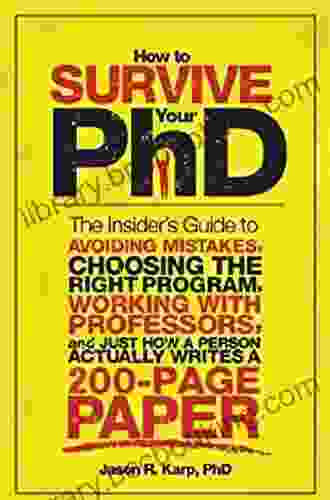The Ultimate Guide to Surviving Your PhD: A Step-by-Step Guide to Success

4.5 out of 5
| Language | : | English |
| File size | : | 515 KB |
| Text-to-Speech | : | Enabled |
| Screen Reader | : | Supported |
| Enhanced typesetting | : | Enabled |
| Word Wise | : | Enabled |
| Print length | : | 226 pages |
Are you a PhD student feeling overwhelmed and lost? Don't worry, you're not alone. This comprehensive guide will provide you with everything you need to know to survive and thrive in your PhD program.
Step 1: Choose the Right Program
The first step to surviving your PhD is to choose the right program. This means finding a program that is a good fit for your research interests, career goals, and learning style.
Here are some things to consider when choosing a PhD program:
- Research interests: What are your research interests? What kind of research do you want to do? Make sure the program you choose has faculty members who are working in your area of interest.
- Career goals: What do you want to do after you graduate? Do you want to stay in academia, work in industry, or start your own business? Make sure the program you choose will prepare you for your career goals.
- Learning style: How do you learn best? Do you prefer a more structured learning environment or a more flexible one? Make sure the program you choose has a learning style that is compatible with your own.
Step 2: Get Funding
Most PhD students need to get funding to cover their tuition and living expenses. There are a number of different ways to get funding, including:
- Teaching assistantships: TA positions involve teaching undergraduate courses. They typically provide a stipend and tuition remission.
- Research assistantships: RA positions involve working on research projects with faculty members. They typically provide a stipend and tuition remission.
- Fellowships: Fellowships are competitive awards that provide financial support to PhD students. They are typically based on merit and research potential.
- Scholarships: Scholarships are another type of competitive award that provide financial support to PhD students. They are typically based on financial need and academic achievement.
Step 3: Find a Mentor
A mentor is a faculty member who can provide you with guidance and support throughout your PhD program. A good mentor can help you choose research topics, develop your dissertation, and navigate the academic world.
Here are some tips for finding a mentor:
- Attend faculty presentations: Attend faculty presentations to get to know the research interests of different faculty members. This is a good way to find potential mentors who share your interests.
- Talk to your classmates: Ask your classmates if they have any recommendations for mentors. They may be able to point you to faculty members who are good mentors and who are a good fit for your research interests.
- Reach out to faculty members directly: If you find a faculty member whose research interests align with your own, don't be afraid to reach out to them and ask if they would be willing to mentor you.
Step 4: Develop a Research Plan
Once you have found a mentor, you need to develop a research plan. This plan should outline your research topic, your research questions, and your methodology.
Here are some tips for developing a research plan:
- Start by brainstorming: What are you interested in researching? What are the big questions that you want to answer? Once you have a few ideas, you can start to narrow down your focus.
- Do a literature review: Once you have a general idea of your research topic, you need to do a literature review to find out what research has already been done in your area. This will help you to refine your research question and develop a unique research plan.
- Develop a research methodology: Once you have a research question, you need to develop a research methodology to answer it. This will involve choosing the right research methods and developing a data collection plan.
Step 5: Write Your Dissertation
The dissertation is the culmination of your PhD program. It is a major research project that demonstrates your knowledge and skills in your field.
Here are some tips for writing your dissertation:
- Start early: Don't wait until the last minute to start writing your dissertation. Give yourself plenty of time to research, write, and revise.
- Break it down into smaller tasks: Writing a dissertation can be a daunting task. Break it down into smaller tasks, such as writing a literature review, developing a research methodology, and writing the different chapters of your dissertation.
- Get feedback from your mentor: Regularly share your work with your mentor for feedback. They can help you to identify weaknesses in your research and writing, and they can provide you with guidance and support.
Step 6: Defend Your Dissertation
Once you have written your dissertation, you need to defend it in front of a committee of faculty members. This is a nerve-wracking experience, but it is also an important opportunity to demonstrate your knowledge and skills.
Here are some tips for defending your dissertation:
- Be prepared: Make sure you know your research inside and out. Practice your presentation and be prepared to answer questions from the committee members.
- Be confident: Believe in your research and your ability to defend it. The committee members are there to assess your work, not to tear it down.
- Be respectful: Treat the committee members with respect, even if you disagree with their questions or comments.
Step 7: Graduate!
After you have successfully defended your dissertation, you will graduate with your PhD. This is a major accomplishment, and you should be proud of yourself for all that you have accomplished.
Congratulations, Dr.!
4.5 out of 5
| Language | : | English |
| File size | : | 515 KB |
| Text-to-Speech | : | Enabled |
| Screen Reader | : | Supported |
| Enhanced typesetting | : | Enabled |
| Word Wise | : | Enabled |
| Print length | : | 226 pages |
Do you want to contribute by writing guest posts on this blog?
Please contact us and send us a resume of previous articles that you have written.
 Book
Book Novel
Novel Page
Page Chapter
Chapter Text
Text Story
Story Genre
Genre Reader
Reader Library
Library Paperback
Paperback E-book
E-book Magazine
Magazine Newspaper
Newspaper Paragraph
Paragraph Sentence
Sentence Bookmark
Bookmark Shelf
Shelf Glossary
Glossary Bibliography
Bibliography Foreword
Foreword Preface
Preface Synopsis
Synopsis Annotation
Annotation Footnote
Footnote Manuscript
Manuscript Scroll
Scroll Codex
Codex Tome
Tome Bestseller
Bestseller Classics
Classics Library card
Library card Narrative
Narrative Biography
Biography Autobiography
Autobiography Memoir
Memoir Reference
Reference Encyclopedia
Encyclopedia Paul Bonnet
Paul Bonnet Linda Cooper Bowen
Linda Cooper Bowen Raymond E Feist
Raymond E Feist Taylor Kirkpatrick
Taylor Kirkpatrick Simone Cave
Simone Cave Tonya Craft
Tonya Craft Greg Keyes
Greg Keyes Nichole Perkins
Nichole Perkins Shirley Roland Ferguson
Shirley Roland Ferguson Neil Clarke
Neil Clarke Ray A March
Ray A March Scott Dawson
Scott Dawson Matt Cook
Matt Cook Lisa Anne Curlin
Lisa Anne Curlin Shannon Leone Fowler
Shannon Leone Fowler Vicki Delany
Vicki Delany Sid Roth
Sid Roth Raymond J Scheicher
Raymond J Scheicher Simon Mann
Simon Mann Rollin Mccraty
Rollin Mccraty
Light bulbAdvertise smarter! Our strategic ad space ensures maximum exposure. Reserve your spot today!

 Holden BellTaking Refuge in a Thai Temple: A Journey of Spiritual Discovery and Cultural...
Holden BellTaking Refuge in a Thai Temple: A Journey of Spiritual Discovery and Cultural...
 Charles ReedImmerse Yourself in the Intriguing World of Classroom of the Elite: A Light...
Charles ReedImmerse Yourself in the Intriguing World of Classroom of the Elite: A Light... Javier BellFollow ·5.4k
Javier BellFollow ·5.4k Derek CookFollow ·8.3k
Derek CookFollow ·8.3k Victor TurnerFollow ·14.4k
Victor TurnerFollow ·14.4k Mario SimmonsFollow ·12.3k
Mario SimmonsFollow ·12.3k Curtis StewartFollow ·8.4k
Curtis StewartFollow ·8.4k Asher BellFollow ·18.1k
Asher BellFollow ·18.1k Edgar Allan PoeFollow ·11.5k
Edgar Allan PoeFollow ·11.5k Clark BellFollow ·16.7k
Clark BellFollow ·16.7k

 Brian Bell
Brian BellExploring The Natural World Through Mindful Expressive...
Unleash the...

 David Baldacci
David BaldacciJourney into the Enigmatic World of "Grass" by Sheri S....
Prepare to be captivated by "Grass," a...

 Dashawn Hayes
Dashawn HayesBusting Myths About Human Nature: Unraveling the Complex...
Challenging the...

 Ernest Hemingway
Ernest HemingwayNotes on Suicide: A Profound Exploration of the...
Suicide, a taboo subject shrouded in...
4.5 out of 5
| Language | : | English |
| File size | : | 515 KB |
| Text-to-Speech | : | Enabled |
| Screen Reader | : | Supported |
| Enhanced typesetting | : | Enabled |
| Word Wise | : | Enabled |
| Print length | : | 226 pages |












